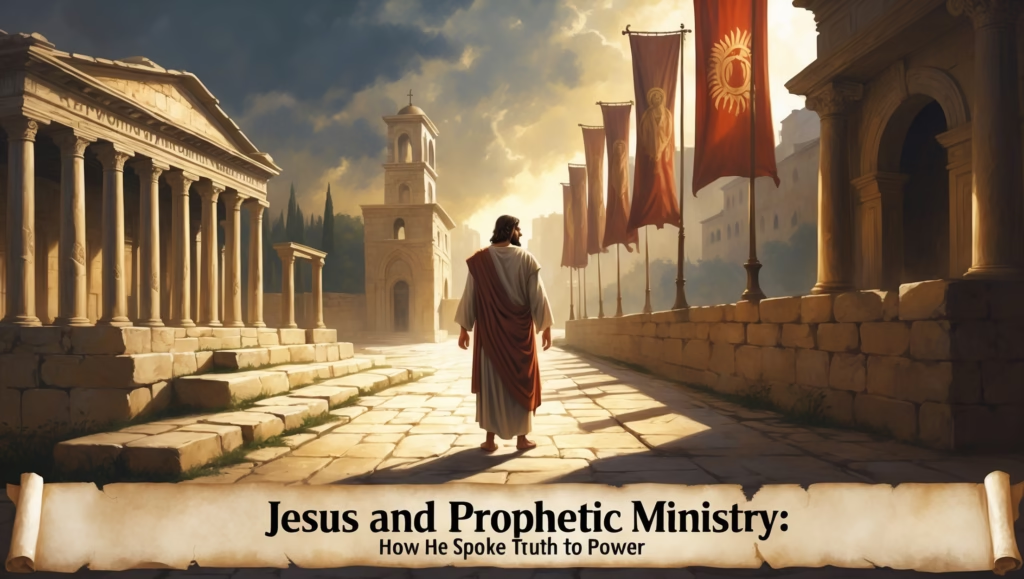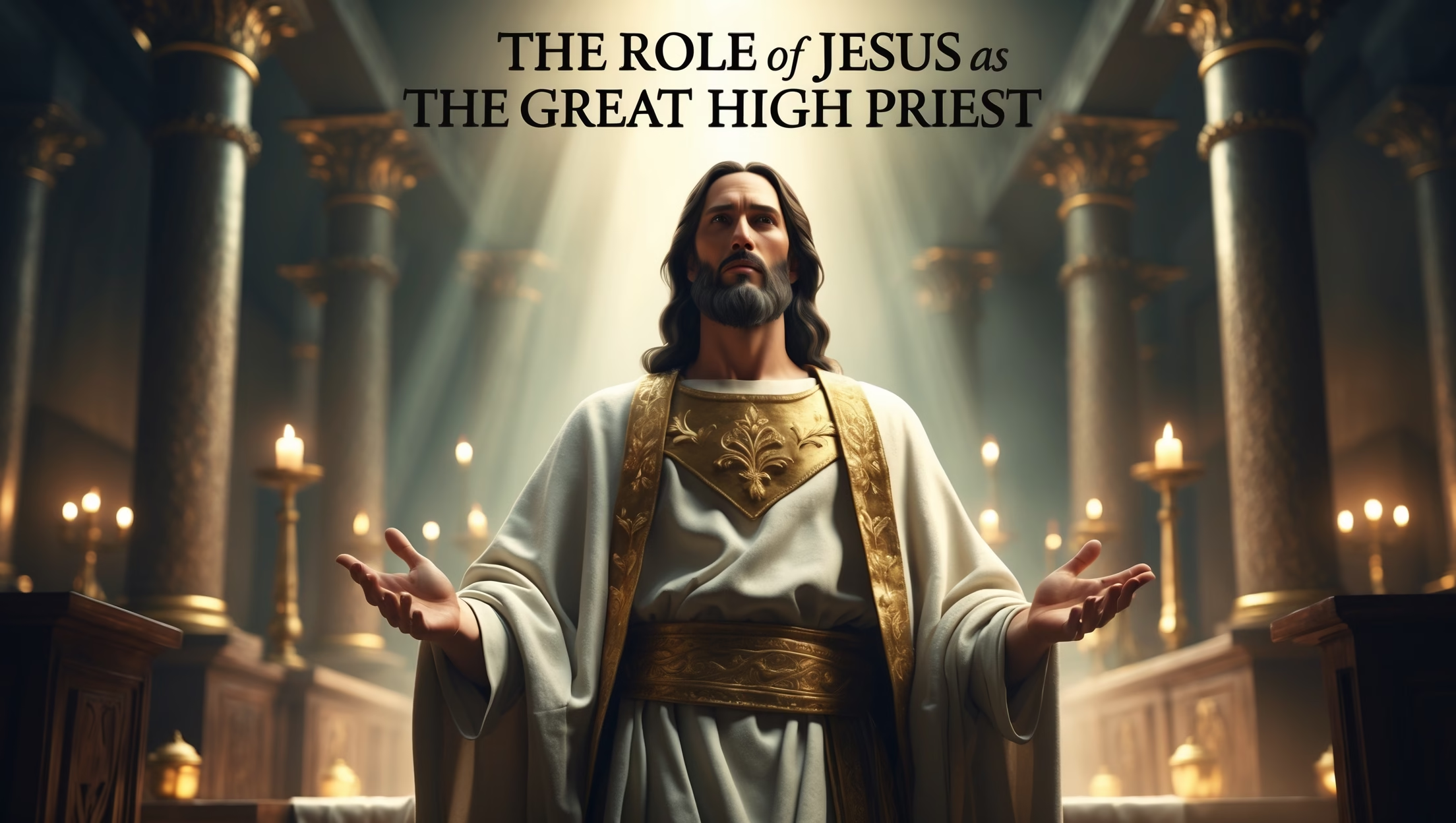Introduction
Jesus was more than a teacher, healer, and miracle worker. He embodied the prophetic tradition of the Old Testament in its purest form—standing firmly for God’s truth, even when this truth brought Him into conflict with the most powerful religious and political figures of His day. His prophetic ministry was not merely about predicting the future; it was about declaring God’s will in the present. Jesus’ prophetic voice challenged hypocrisy, confronted corruption, and revealed the coming kingdom of God. In Him, courage and compassion found perfect balance, as He spoke with authority yet carried His message with grace and love. His ministry demonstrates that prophetic witness is not about gaining power or prestige but about faithfully representing the heart of God.

Prophets in the Old Testament
To understand Jesus’ prophetic ministry, it is essential to consider the foundation laid by the prophets of the Old Testament. Figures like Isaiah, Jeremiah, Amos, and Micah were called to confront kings, priests, and people when they strayed from God’s commands. Their role was not to please the crowd but to speak the sometimes-unwelcome truth of God’s covenant.
Isaiah called out Israel’s trust in foreign alliances instead of God’s protection. Jeremiah wept over the nation’s stubbornness, warning of judgment if they refused to repent. Amos thundered against social injustice, declaring that God despised worship that was not accompanied by righteousness: “Let justice roll on like a river, righteousness like a never-failing stream!” (Amos 5:24). These prophets showed that God cared not just about religious rituals but about justice, mercy, and humility.
Jesus stood firmly in this tradition, but His ministry did more than echo the prophets—He embodied and fulfilled them. While Isaiah foresaw a suffering servant, Jesus became that servant. While Jeremiah lamented over Jerusalem, Jesus wept for the city as well. The prophetic stream reached its climax in Him, for He was not only God’s messenger but God’s Son, speaking divine truth with ultimate authority.
Jesus Against Religious Hypocrisy
One of the most striking aspects of Jesus’ prophetic ministry was His confrontation with religious hypocrisy. His boldest words were often directed not at Rome, but at the Pharisees, scribes, and Sadducees—the religious elite who claimed to safeguard God’s law. Jesus did not condemn them for devotion to Scripture but for distorting it. They elevated human traditions above God’s heart, prioritizing ritual purity over compassion, and external appearances over inward transformation.
In Matthew 23, Jesus issued a series of prophetic woes: “Woe to you, teachers of the law and Pharisees, you hypocrites!” He exposed how they placed heavy burdens on people without lifting a finger to help, and how they focused on tithing herbs while neglecting weightier matters of the law—justice, mercy, and faithfulness. This fearless confrontation revealed that Jesus’ prophetic ministry was not simply about rebuking sin in general, but specifically about exposing the misuse of religious authority.
By speaking truth to these leaders, Jesus revealed that God’s kingdom is not impressed by outward performance but by inward righteousness. His prophetic words continue to resonate today, challenging any form of faith that prioritizes rules and appearances over genuine love for God and neighbor.
Jesus and Political Power
While much of His ministry focused on religious corruption, Jesus also prophetically confronted political power. His life and message declared that no earthly empire could claim ultimate authority, for the true kingdom belonged to God. When questioned about paying taxes to Caesar, Jesus’ response—“Give back to Caesar what is Caesar’s, and to God what is God’s”—was not mere political cleverness. It was a prophetic reminder that Rome’s authority was limited and that ultimate allegiance belonged to the Creator.
Herod Antipas feared Jesus because He would not be manipulated into legitimizing corrupt rule. Pilate, though perplexed, recognized that Jesus’ kingship posed a challenge far greater than political rebellion—it was a claim to a higher authority, rooted not in violence but in divine truth. “My kingdom is not of this world,” Jesus declared, making it clear that His prophetic witness was not about overthrowing Rome through force, but about exposing the false claims of absolute power.
This confrontation with political powers ultimately led to the cross. The empire crucified Him, thinking it had silenced Him, but His prophetic witness only grew louder, proving that the voice of God cannot be suppressed by earthly rulers.
Truth Spoken in Love
What distinguished Jesus’ prophetic ministry from many of the Old Testament prophets was the way He embodied truth in love. While the prophets of old often delivered stern judgments, Jesus combined bold confrontation with deep compassion. Even His harshest words were motivated by a desire for restoration rather than destruction.
When He rebuked the Pharisees, it was not out of hatred but out of grief that they were missing the heart of God. When He warned Jerusalem of its coming judgment, He wept over the city, lamenting that they had rejected the things that would bring them peace. His truth-telling was never detached from His deep love for the people He came to save.
On the cross, this prophetic love reached its climax. Rather than cursing His enemies, Jesus prayed, “Father, forgive them, for they know not what they do.” His ministry shows us that speaking truth to power is not about anger or vengeance but about faithfully representing God’s justice and mercy.
Application for Today
Jesus’ prophetic ministry continues to call His followers to action today. Christians are not merely called to private piety but to prophetic witness in a world marked by injustice, corruption, and oppression. This means speaking truth to power when governments abuse authority, when religious leaders misuse influence, or when societies neglect the vulnerable.
Yet, like Jesus, this must be done with humility, prayer, and love. Prophetic witness is not about shouting louder than others or seeking personal recognition; it is about aligning with God’s truth, even when it is costly. It requires courage to confront systems of injustice, but also compassion to seek restoration.
In a world where truth is often distorted for political or personal gain, the example of Jesus reminds us that the prophetic voice must be both bold and loving. Defending the poor, advocating for justice, and resisting hypocrisy are not optional extras of the Christian life—they are central to following Christ.
Conclusion
Jesus’ prophetic ministry stands as a powerful reminder that God’s truth is not bound by human structures of power. Like the prophets before Him, He spoke with authority, but unlike them, He fully embodied the Word of God. His fearless confrontation of hypocrisy, His resistance to political manipulation, and His unwavering commitment to justice reveal the heart of God in action.
Even today, His example challenges us to be courageous truth-tellers. To follow Jesus is to take up the mantle of prophetic witness—not with arrogance or self-righteousness, but with humility, compassion, and unwavering faithfulness. The prophetic ministry of Jesus reminds us that truth, when spoken in love, has the power to transform lives and challenge the mightiest of powers.
The world may resist, as it did in His time, but just as the cross could not silence Him, neither can any force silence the ongoing witness of His people. The prophetic voice of Christ continues to echo, calling us to justice, mercy, and truth.










